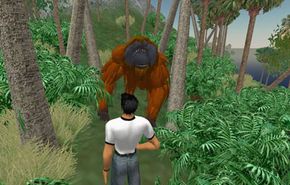Popular culture is filled with different notions of what artificial intelligence should or will be like. There's the all-powerful Skynet from the "Terminator" movies, "Star Wars"-style androids, HAL from "2001: A Space Odyssey," the classic sentient computer program, carrying on a witty conversation through a computer terminal. Soon, we may have to add another to the list. In September 2007, a software company called Novamente, along with the Electric Sheep Company, a producer of add-ons for virtual worlds, announced plans to release artificial intelligences (AI) into virtual worlds like the ultra-popular "Second Life."
Video Game Image Gallery
Advertisement
Novamente's "intelligent virtual agents" would use online games and virtual worlds as a development zone, where they will grow, learn and develop by interacting with humans. The company said that it will start by creating virtual pets that become smarter as they interact with their (human-controlled) avatar owners. (An avatar is the character or virtual representation of a player in a virtual world.) More complex artificially controlled animals and avatars are expected to follow.
Novamente's artificial intelligence is powered by a piece of software called a "Cognition Engine." Pets and avatars powered by the Cognition Engine will feature a mix of automated behaviors and learning and problem-solving capabilities. Ben Goertzel, the CEO of Novamente, said that his company had already created a "fully functioning animal brain" [source: BBC News]. Goertzel envisioned Novamente's first artificial intelligences as dogs and monkeys, initially going on sale at your local virtual pet shop in October 2007.
These virtual pets will work much like real pets -- trainable, occasionally misbehaving, showing the ability learn and perform tasks and responding positively to rewards. After dogs and monkeys, Novamente would then move on to more complex creatures, such as parrots that, like their real-life counterparts, could learn to speak. Finally, the company expects to produce virtual human babies that, propelled by its own artificial intelligence, would grow, develop and learn in the virtual world [source: BBC News].
While we frequently see or read about robots with interesting capabilities, scientists have struggled for decades to create anything approaching a genuine artificial intelligence. A robot may be an expert at one skill, say shooting a basketball, but numerous basic tasks, such as walking down stairs, may be beyond its capabilities. This is where a virtual world has its advantages, Goertzel says.
On the next page, we'll look at why virtual worlds may present the next and best frontier for the development of artificial intelligence.
Advertisement

